- Home
- Gordon Korman
Collision Course Page 8
Collision Course Read online
Page 8
“My dear lady!” the captain protested. “Surely you know that Maritime law places the utmost value upon the safety of women and children!”
“My apologies, madam.” Wireless Operator Phillips stepped around Mrs. Bronson and held a message slip out to the captain. “From the Baltic, sir. Reporting large quantities of pack ice, latitude 41 51’ N, longitude 49 52’ W.”
“That’s about two hundred miles ahead of us,” Lightoller supplied.
Captain Smith preferred not to discuss ship’s business when there was a lady present. That was how rumors began. “Is that all, Mr. Phillips?”
“It’s possible that we missed a few others while the equipment was down,” the operator admitted.
Frowning, the captain accepted the paper and passed it, unread, to Ismay.
The managing director didn’t read it, either.
The Grand Staircase was Sophie’s favorite part of the Titanic. It wasn’t just beautiful; it was startling in its beauty. How many times had she stood in this very spot — on the C-Deck landing, looking down upon the reception area outside the first-class saloon? The magnificent stained-glass dome overhead was turned luminous by the dusk. The gathering diners seemed to glow, as if nature itself had cast a spotlight upon these special and celebrated people.
That evening, Julie was with her father. Now that his awful plan was in jeopardy, the earl had remembered he had a daughter. And Mother was in second class, trying to organize a group of suffrage converts. Sophie was on her own — an unescorted young lady in an evening gown. Not long ago, it would have been a scandal. But this was an amazing new century of wireless messages, electric lights, and unsinkable ships. So much progress in a few short years! What the future might hold, no one could imagine.
She spied Alfie, who was settling Mr. Masterson into a chair in the reception area. She gave the young steward a small wave, but he was studiously ignoring her. So that was how it was going to be, she reflected glumly. Poor Alfie. He couldn’t risk being associated with her, and therefore Juliana, and therefore Paddy. She understood, yet it saddened her just the same.
Mr. Masterson was being irascible, as usual, growling with a sour face, and actually poking Alfie with his crutch when he was ready to be left alone. What a truly disagreeable person! But Jack the Ripper? That had to be Alfie’s overactive imagination. Surely there was another explanation for that scrapbook.
I’m going to get to the bottom of it, Sophie promised herself.
Her long gown swept gracefully down the carpeted stairs as she descended to the reception room. She seated herself across from the old man and held out her hand. “Good evening, Mr. Masterson. I’m Sophie Bronson.”
He made no move to take it. “I know who you are,” he said with a scowl. “You’re the daughter of that god-awful suffragette.”
Sophie bristled. “The term is ‘suffragist.’ ”
“Renegade would be a better word. What else would you call a shameless rabble-rouser bent on overturning the natural order of things?”
She burned at the insult to her mother, but resisted the urge to walk away. She had no right to be surprised that this man was unpleasant. Passengers and crew had been complaining about him ever since the ship had left Southampton.
“I’ll be blunt, sir,” she said, mustering her nerve. It was not every day that you asked a gentleman to explain that he was not Jack the Ripper. “A scrapbook belonging to you was found loose in the baggage hold — a detailed chronicle of the Whitechapel murders of 1888 —”
“Found?” Masterson’s eyes widened. “By whom?”
“I found it myself,” Sophie lied. She could not risk making more trouble for Alfie. “I was searching for a hatbox when I noticed it had fallen out of your trunk.”
“Who else knows of this?” he demanded. “Did you tell any member of the crew?”
Sophie shook her head. “I don’t wish to cause you any embarrassment. But I’m interested to know why you would own such a thing. I realize that your life is hard and that your legs cause you constant pain. Yet how does that explain your fascination with such terrible crimes?”
Masterson peered into her eyes, taking her measure. “I shall give you the explanation you seek,” he said at last.
Sophie sat back expectantly.
“Not here,” he added. “Not with these eavesdropping vipers all around. You alone understand the misery that is my world, and this account is for you alone. Meet me on the forecastle deck after dinner.”
“The forecastle deck?” Sophie echoed in surprise. “Isn’t that an awfully long walk for you?”
“I must exercise continually lest I lose the use of my legs altogether. I prefer the late hours when I don’t have to navigate around rich fools at every step. Shall we say eleven thirty?” Before she could answer, he added, “Dress warmly, Miss Bronson. I hear the night is going to be extremely cold.”
CHAPTER SEVENTEEN
RMS TITANIC
SUNDAY, APRIL 14, 1912, 11:25 P.M.
When the hand closed on his sleeve, Alfie was so shocked that he nearly dropped a full-length chinchilla wrap that cost more than the pay of a junior steward for twenty years. He wheeled around to see Juliana skulking in the shadows of the open A-Deck promenade, hugging herself against the chill.
“Miss Julie!” Alfie exclaimed. “You gave me a fright!”
“I’m trying to be discreet about our friendship,” she whispered, “as you requested.”
“One of the fellows asked me to bring this wrap to Mr. Guggenheim’s companion,” Alfie told her. “If I damage it, I might as well jump over the rail.”
“I apologize for startling you,” said Juliana. “And I apologize for getting Paddy arrested and for casting suspicion upon you. Honestly, at this moment, I can’t think of a single thing in my life that I’m not sorry about. My father, certainly”
“I see he is back to his card game in the lounge.”
She nodded. “I knew his concern for my reputation wouldn’t distract him long from his first love. And Sophie is off with your Mr. Masterson —”
“Masterson?” This time Alfie really did drop the fur wrap. He scrambled to pick it up. “Why?”
Juliana shrugged. “He’s her project. She thinks showing him kindness will civilize the man. She’s becoming a crusader like her mother.”
“Where?” Alfie barked urgently. “Did she say where they were meeting?”
“The forecastle deck. He takes a late walk to —”
Alfie did not wait for her to finish the sentence. He turned tail and pounded along the promenade, disappearing down a forward passageway.
The chinchilla wrap lay discarded on the deck.
By day, the forecastle of the Titanic thronged with activity; by night it was a broad, deserted battlement. No, not deserted, Sophie reminded herself as she climbed the stairs from the well deck. To her left towered the base of the foremast. High above, she knew, were two lookouts in the crow’s nest. And, of course, Mr. Masterson was here somewhere.
There was little protection from the bitter cold wind, and she shivered beneath her cloak. Mr. Masterson’s choice of meeting place was as odd as his choice of topic for a hobby scrapbook. But all that would be revealed soon enough.
She spied a figure leaning on a crutch at the rail. “Mr. Masterson?”
“Come here, child, and observe. The sea is flat as glass.” The voice was gruff, yet the tone was friendly.
He can be nice when people are nice to him.
She joined him. “Like a mirror,” she agreed. “You can even see the reflection of the stars.”
She waited expectantly, smiling up into his weathered face. He had promised her an explanation. When none came, she prompted gently, “You were going to tell me about the scrapbook.”
In answer, he reached out and seized her with a grip of startling power. “Stupid daughter of a stupid mother! Not to recognize the evidence of your own eyes! That scrapbook is not a hobby! It’s a celebration of my masterpiece!”
Sophie tried to scream but an iron hand clamped over her mouth. This seemingly helpless cripple had the strength of ten men in his arms. Her feeble struggles were in vain as he pressed her against the rail. With her body now immobilized, he reached inside his breast pocket and drew out a shadowy object. Shiny steel reflected the distant lights of the Titanic’s superstructure.
Sophie’s eyes widened in horror. It was a hunting knife with a long, serrated blade.
Mr. Masterson was triumphant. “For twenty-four years, my work has been stifled by these worthless legs, but no longer!” The knife came toward her. At the last second, a delicate twist cut the string of pearls from her around throat. “So my scrapbook is of interest to you! Perhaps it will be some consolation that you will grace the latest page! These baubles will be my memento!”
“You’ll be caught!” Sophie breathed. “You’ll hang!”
His smile was cruel. “I don’t think so. You’re such a little thing” — all at once, she felt her feet leave the deck as he lifted her up and over the rail — “and the ocean is so large.”
She tried to call for help, but could only manage a terrified gasp.
CHAPTER EIGHTEEN
RMS TITANIC
SUNDAY, APRIL 14, 1912, 11:39 P.M.
Forty-five feet up, in the crow’s nest, lookouts Frederick Fleet and Reginald Lee were completely unaware of the drama taking place below them on the forecastle deck. Their eyes were scanning the Atlantic ahead.
The night was clear, the sea perfectly calm, but this only made their job more difficult. With no wave action, it would be impossible to spot a large berg by the white water at the base. Worse, there was no moon at all. Fleet hoped that the thousands of stars out tonight would provide enough light to see the approach of the ice that had been reported in the shipping lanes.
Symons, the previous lookout, insisted that “you can smell the ice before you get to it.” Fleet hoped so. Right now, he smelled — and saw — nothing.
And then the emptiness moved.
He blinked. Something lay ahead, something darker than the night. How was that possible? In the next moment, he knew all too well. An immense form was approaching, blocking the stars as it drew closer.
There was only one possible explanation.
He rang the crow’s nest bell three times — the signal for danger. Heart pounding, he picked up the telephone to the wheelhouse. “Is anyone there?” he rasped.
On the bridge, Sixth Officer Moody answered the call. “What do you see?”
“Iceberg right ahead.”
“Iceberg right ahead!” Moody bawled to First Officer Murdoch, who was in command.
“Hard a’ starboard!” shouted Murdoch. Even as he gave the order, he ran for the engine room telegraph, signaling full speed astern. The way to stop a moving ship was to throw the screws into reverse.
At the helm, Quartermaster Hichens twirled the wheel hard over, twisting his body as if the shifting of his weight might somehow coax the huge ocean liner to turn more quickly.
The five crew members on the bridge stared anxiously out over the prow, waiting for the nose of the ship to swing away from the menacing black shape that blocked their path.
Alfie pounded up the stairs from the well deck and peered urgently around the darkened forecastle. The electric lights of the bow were shut off for the overnight hours to aid the lookouts in the crow’s nest.
A faint cry — more of a whimper — reached his ears, and he pivoted in the direction of the sound. The sight that met his eyes very nearly stopped his heart.
Mr. Masterson had Sophie against the rail — half over it, in fact. In his right hand he wielded a vicious-looking saw-toothed knife.
Alfie ran blindly, wildly, with no clear plan in his mind except to stop this latest Whitechapel murder twenty-four years after the fact. He grabbed the knife arm, straining to direct the weapon away from Sophie.
“You!” Masterson seethed, concentrating his considerable force on the tug-of-war with Alfie.
The blade began to move, slowly yet inexorably, toward Sophie’s throat. Alfie pulled with all his might, grunting with the effort to stop the knife’s deadly progress. It was no use. He thought back to the Titanic’s gymnasium — the man’s almost supernatural upper-body strength.
I’ll never overpower him this way….
Out of options, Alfie reared back his foot and slammed it into the crippled man’s knee.
The howl of agony that came from Mr. Masterson was barely human. He went down like a sack of oats, his crutch flailing above him. The knife clattered to the deck.
“Alfie!” Now free of the killer’s hold, Sophie was rolling over the top of the rail, completely untethered to the ship.
Alfie lunged, barely getting his hands around her waist before she fell. He hauled her back aboard and the two of them collapsed in a heap.
“Are you all right?” Alfie rasped.
Sophie pointed, her face full of dread. Mr. Masterson was on his feet once more, leaning heavily on his crutch. In his hand was a small black revolver.
The gun was pointed at them.
In the crow’s nest, lookouts Fleet and Lee heard voices below, but their attention never wavered from the approaching iceberg, now just off the Titanic’s bow.
Why doesn’t she turn? Fleet thought desperately. It seemed an eternity since he’d telephoned his warning to the wheelhouse.
On the bridge, First Officer Murdoch understood all too well. The world’s largest ocean liner could not be steered like a team of horses. He had silently counted thirty seconds, and still the ship was steaming directly toward the obstacle.
Finally the prow began to swerve to port. The forepeak pivoted away from the berg, and suddenly the mountain of ice was passing them close on the starboard side.
Murdoch held his breath. Had they made it?
Masterson’s words came out in halting gasps, but his arm was ramrod straight as he held the pistol on Alfie and Sophie. “Do you honestly think,” he puffed in outrage, “that I’d let a meddling lackey and a silly wench come between me and my destiny?”
“What destiny?” Alfie shot back. “To kill people? To be Jack the Ripper again?”
“I was always he!” Masterson stormed. “Don’t let this broken body deceive you! If my operation is successful, my work can resume! Just think of it — a new country in which I shall continue my great quest. But I’m afraid you two will not be there to see it.” There was a click as he released the safety catch of his revolver. “It is not my weapon of choice. But for an old cripple, simplicity is important. Useless legs cannot hinder the effectiveness of a bullet. Nothing can, I’m afraid….”
So focused was Alfie on the barrel of Masterson’s gun that he nearly missed what happened next. An enormous blue-black mountain came up on the starboard bow. For a moment, the Titanic seemed to vibrate, a grinding sensation from deep within the ship. Far below the waterline, a spur of ice scraped against the hull, buckling the metal plating. Rivets popped by the thousands, allowing the relentless sea to rush inside under pressure. In Number 6 Boiler Room, the bulkhead suddenly vanished, to be replaced by a torrent of frigid ocean that washed out the stokers and sent shovelfuls of coal flying.
Up on the forecastle, a series of sharp cracks sounded as chunks of shattered ice broke from the berg. They struck the deck and tumbled across the polished hardwood. One of them knocked the crutch out from under Masterson’s weight, and the crippled man went down hard.
Alfie did not hesitate. He hurled himself at the fallen assailant and clamped his hands onto the gun still clenched in Masterson’s hand. But the killer recovered quickly, twisting the weapon so that the barrel was pointing at the young steward’s face.
A split second from death, Alfie’s whirling thoughts turned to his mother. You were right to fear Jack the Ripper, Mum — even all these years after Whitechapel….
Sophie’s pink satin slipper slammed into the pistol, sending it skittering under the rail. It dropped
to the well deck with a clunk.
Alfie heard Masterson’s enraged roar, followed by a brutal slap, and Sophie’s cry of pain. Then he saw the crutch swinging toward the side of his head.
Explosion of impact, blinding light.
Darkness.
CHAPTER NINETEEN
RMS TITANIC
SUNDAY, APRIL 14, 1912, 11:40 P.M.
On the bridge, the collision was nothing remarkable — a brief grating jar that replaced the steady vibration of the engines for a few seconds. But there was no mistaking the iceberg, towering one hundred feet out of the water, passing on the starboard side. Immediately, Murdoch threw the switch to close the watertight doors.
In Number 5 Boiler Room, the cascade of inrushing water was so loud that John Huggins barely noticed the alarm bell until the iron hatch began to lower. Stokers, drenched and bellowing, leaped, scrambled, and crawled through the passage from Number 6. One fireman slipped on the slick deck and flopped on his face, inches from being crushed by the descending metal. Huggins grabbed his wrist and pulled him through just as the heavy door locked into place. The bulkhead was sealed, but the gash in the hull extended well past it, the sea pouring into the belly of the Titanic.
At that moment, Captain E. J. Smith rushed onto the bridge to a barrage of reports about the nature of the accident. The experienced seaman listened grimly. It was entirely possible that, by reversing the engines, his first officer had made a grave error. A large liner was most maneuverable when she was moving the fastest. If the Titanic had maintained speed, she might have missed the iceberg altogether.
Smith did not say this aloud, of course. Any sailor worth his salt knew that the past was past. All that mattered was the here and now. How serious was the damage?
No one yet knew.
“Ask the carpenter to sound the ship,” he ordered. “And summon Mr. Andrews.”
Alfie awoke to a throbbing in his head and a burning cold against his jaw. When he opened his eyes, he saw Sophie, kneeling over him, her face bruised and anxious, holding a brick-sized piece of ice to his cheek.

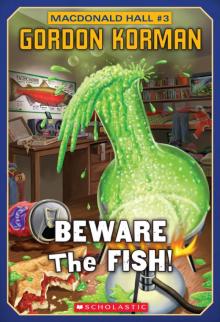 Beware the Fisj
Beware the Fisj Slacker
Slacker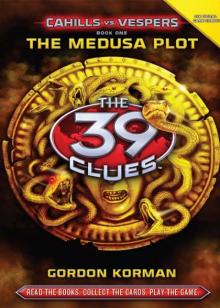 The Medusa Plot
The Medusa Plot This Can't Be Happening at MacDonald Hall!
This Can't Be Happening at MacDonald Hall!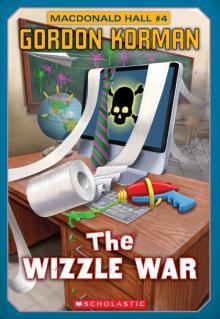 The War With Mr. Wizzle
The War With Mr. Wizzle The Emperor's Code
The Emperor's Code Zoobreak
Zoobreak The Danger
The Danger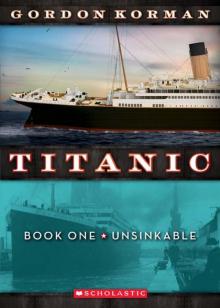 Unsinkable
Unsinkable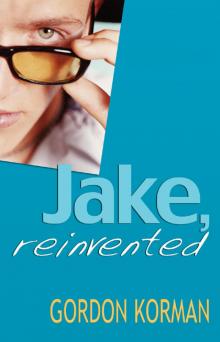 Jake, Reinvented
Jake, Reinvented No More Dead Dogs
No More Dead Dogs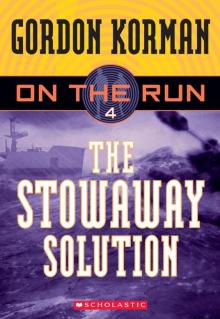 The Stowaway Solution
The Stowaway Solution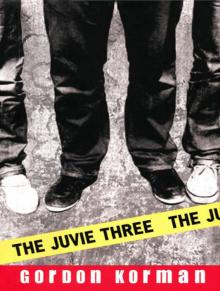 The Juvie Three
The Juvie Three The Climb
The Climb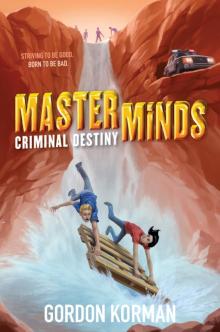 Criminal Destiny
Criminal Destiny Hideout: The First Adventure
Hideout: The First Adventure Flashpoint
Flashpoint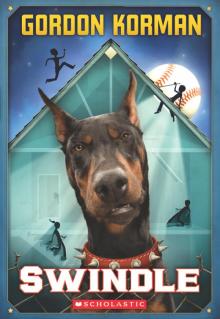 Swindle
Swindle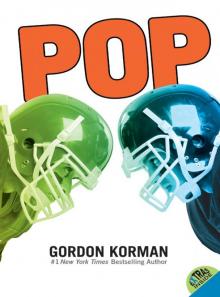 Pop
Pop The Rescue
The Rescue Memory Maze
Memory Maze The Sixth Grade Nickname Game
The Sixth Grade Nickname Game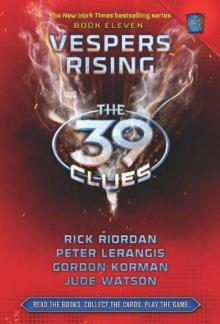 Vespers Rising
Vespers Rising Collision Course
Collision Course The Abduction
The Abduction Losing Joe's Place
Losing Joe's Place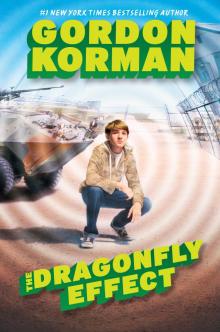 The Dragonfly Effect
The Dragonfly Effect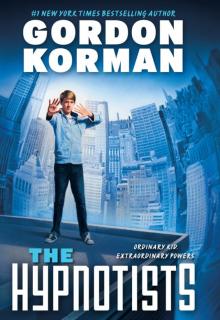 The Hypnotists
The Hypnotists Survival
Survival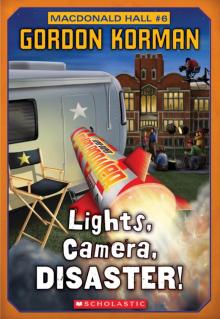 Lights, Camera, DISASTER!
Lights, Camera, DISASTER! Payback
Payback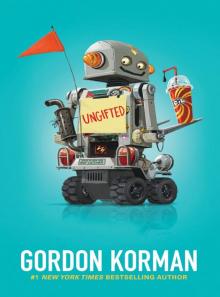 Ungifted
Ungifted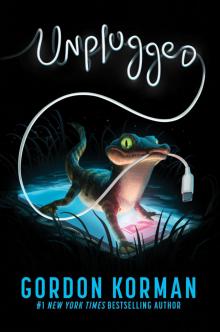 Unplugged
Unplugged Framed
Framed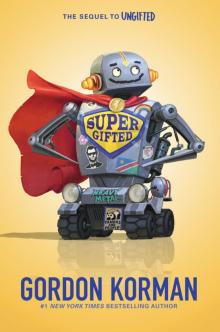 Supergifted
Supergifted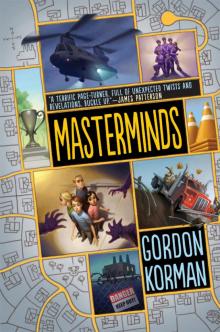 Masterminds
Masterminds Jackpot
Jackpot Don't Care High
Don't Care High The Deep
The Deep Go Jump in the Pool!
Go Jump in the Pool! The Contest
The Contest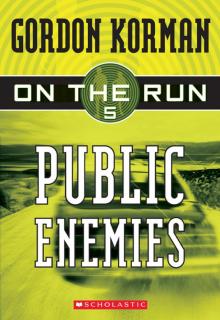 Public Enemies
Public Enemies Hideout: The Second Adventure
Hideout: The Second Adventure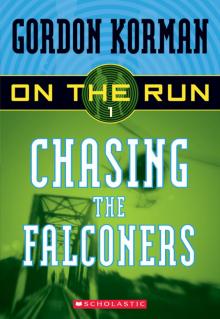 Chasing the Falconers
Chasing the Falconers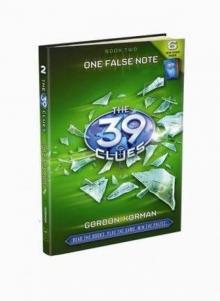 One False Note
One False Note Shipwreck
Shipwreck Jingle
Jingle Unleashed
Unleashed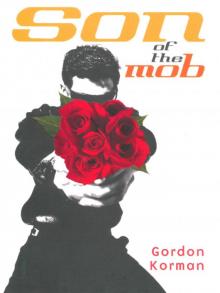 Son of the Mob
Son of the Mob Now You See Them, Now You Don't
Now You See Them, Now You Don't War Stories
War Stories Schooled
Schooled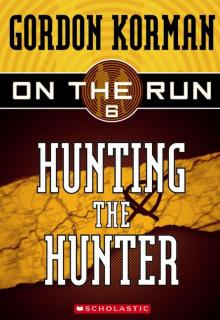 Hunting the Hunter
Hunting the Hunter The Zucchini Warriors
The Zucchini Warriors A Semester in the Life of a Garbage Bag
A Semester in the Life of a Garbage Bag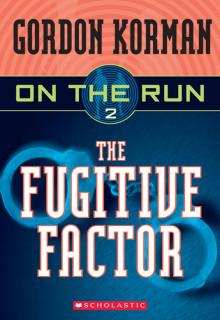 The Fugitive Factor
The Fugitive Factor Born to Rock
Born to Rock The Summit
The Summit Showoff
Showoff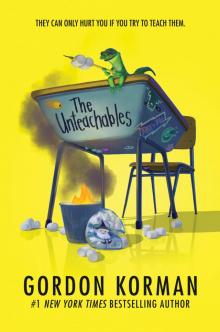 The Unteachables
The Unteachables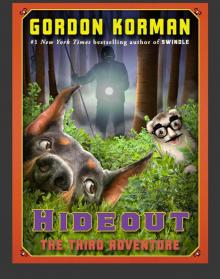 The Third Adventure
The Third Adventure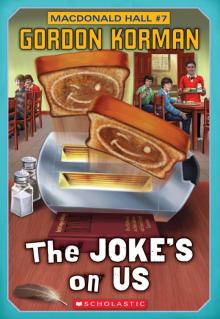 The Joke's on Us
The Joke's on Us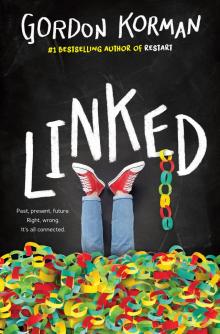 Linked
Linked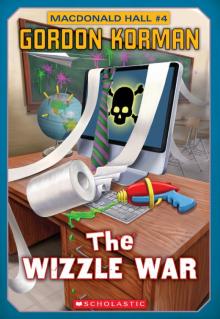 The Wizzle War
The Wizzle War The 6th Grade Nickname Game
The 6th Grade Nickname Game The Second Adventure
The Second Adventure The First Adventure
The First Adventure![39 Clues : Cahills vs. Vespers [01] The Medusa Plot Read online](http://i1.bookreadfree.com/i2/04/10/39_clues_cahills_vs_vespers_01_the_medusa_plot_preview.jpg) 39 Clues : Cahills vs. Vespers [01] The Medusa Plot
39 Clues : Cahills vs. Vespers [01] The Medusa Plot